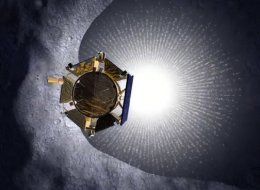
Not content with the
destruction on our own world, we now lob explosives at other celestial bodies. What
a piece of work is man.
Just kidding. I think
it’s marvelous we’re studying water content on the moon, and I’m excited about
space exploration as the next person. But, as I said in a prior
post, I’m concerned about the costs. And now I’m concerned about our
methods.
Why must we use such
crude forms of observation to get our scientific data? The moon may be our
nearest neighbor in the solar system, but who says it belongs to us? If there’s
water on it, who’s to say there aren’t also some strange, unimagined new forms
of life — that we’re potentially destroying with our little bomb?
Anyhow, I’m totally exaggerating here, but my point stands (sort of). If the only way we can explore is to cause destruction and damage to the very place about which we want to learn more, might we not want to wait a little while longer until our technology is such that we could… I don’t know… perhaps land gingerly on the surface of the area we want to study, take a less elephant-gun-to-swat-a-fly approach to grabbing a sample, and lift off without doing harm to the surface of the moon?
NASA’s LCROSS mission FAQ page says the impact will do no more harm than any other meteor striking the moon’s surface, but I wonder, do we have the right to add one more? I mean, it only took one to kill off the dinosaurs, if you believe popular scientific theory.
I’m just asking. The moon’s our satellite, but it’s not our plaything.
Or is it? Are you watching the NASA moon bombing video?
Subscribe to receive updates from Everyday Ethics or follow us on Twitter!

